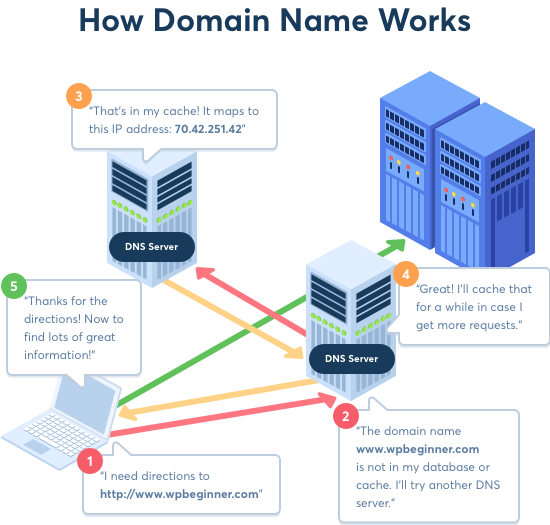We are often asked by beginners: what is a domain name and how do domains work? If you are a beginner, then you may have heard that you need a domain to make a website. However, many beginners confuse domain name with a website or website hosting service. If you are just starting out, then all these different terms may sound too technical.
What is a Domain Name?
Domain name is the address of your website that people type in the browser URL bar to visit your website. In simple terms, if your website was a house, then your domain name will be its address.
A more detailed explanation:
The Internet is a giant network of computers connected to each other through a global network of cables. Each computer on this network can communicate with other computers. To identify them, each computer is assigned an IP address. It is a series of numbers that identify a particular computer on the internet. A typical IP address looks like this:
66.249.66.1
Now an IP address like this is quite difficult to remember. Imagine if you had to use such numbers to visit your favorite websites. Domain names were invented to solve this problem. Now if you want to visit a website, then you don’t need to enter a long string of numbers. Instead, you can visit it by typing an easy to remember domain name in your browser’s address bar. For example, wpbeginner.com.
How Domain Names Actually Work?
To understand how domain names actually work, we will take a look at what happens when you enter it in your browser.

When you enter a domain name in your web browser, it first sends a request to a global network of servers that form the Domain Name System (DNS). These servers then look up for the name servers associated with the domain and forward the request to those name servers.
For example, if your website is hosted on Bluehost, then its name server information will be like this:
ns1.bluehost.comns2.bluehost.com
These name servers are computers managed by your hosting company. Your hosting company will forward your request to the computer where your website is stored. This computer is called a web server. It has special software installed (Apache, Nginx are two popular web server software). The web server now fetches the web page and pieces of information associated with it. Finally, it then sends this data back to the browser.
How is Domain Name Different from a Website and Web Hosting?

A website is made up of files like HTML pages, website builder software, images, and more. If the domain name is the web address of your website, then web hosting is the home where your website lives. This is the actual computer where your website’s files are stored. Such computers are called servers and they are offered as a service by hosting companies.
To create your website, you need both domain name and web hosting.
However, it’s important to remember that they are two separate services, and you can buy them from two different companies. Now you may be wondering, how would it work if you bought them from two separate companies? You just need to edit your domain name settings and enter the Name Server information provided by your hosting company. Name Server information defines where to send user requests for your domain name. We recommend getting both your domain name and hosting from the same company. This allows you to easily manage them under the same account.
How to Choose a Domain Name for Your Website?

There are currently more than 350 Million registered domain names and thousands more get registered each day. This means that all the good ones are already registered or will be registered very soon. This puts a lot of pressure on new users to come up with a domain idea for their website.
Here are some quick tips to help you choose a domain name for your next website.
- Stick with a .com domain name as it is the most popular, easy to remember, and easy promote.
- Make sure it is shorter and easy to remember.
- Make it easy to pronounce and spell.
- Do not use numbers or hyphens.
Frequently Asked Questions About Domain Names
Over the years we have helped thousands of beginners start their first websites. We have heard almost every possible question about domain names that you can think of. Following are the answers to some of the most commonly asked questions about domain names.
1. What is a subdomain?
A subdomain is basically a child domain under the main domain name. For example, videos.wpbeginner.com is a subdomain of wpbeginner.com. Once you register a domain, you have the permission to create subdomains for it by yourself. Subdomains are commonly used by websites to create child-sites under the same domain name. For example, a business website can create a subdomain for their blog or their online store as store.example.com or blog.example.com.
2. Can I cancel my registration of a domain name?
Some domain registrars allow you to cancel your domain registration at any time. If you cancel your registration, it will become available for others to register. Other domain name registrars allow you to simply let your domain registration expire. In most cases, you will not get any refund for the domain registration. If you don’t have the auto-renew feature turned on, then your domain name will simply expire after the registration period you have paid for.
3. Can I move my website to a different domain name?
Yes, you can. You can point your domain name to your hosting server. You can also keep both domain names pointing to the same website. However, search engines consider it duplicate content and that will affect your search rankings.
4. What is domain privacy? Do I need it?
ICANN requires people registering domain names to provide an email, physical address, phone number, and other personal information to be made available publicly. Domain Privacy is a separate add-on service sold by domain registrars. It allows you to show proxy information instead of your actual personal info. You don’t need to buy domain privacy if you don’t want to. However if you are concerned about privacy, then you can buy this service for a small cost.
5. Can I buy more than one domain name?
Yes, you can buy as many domain names as you like.
